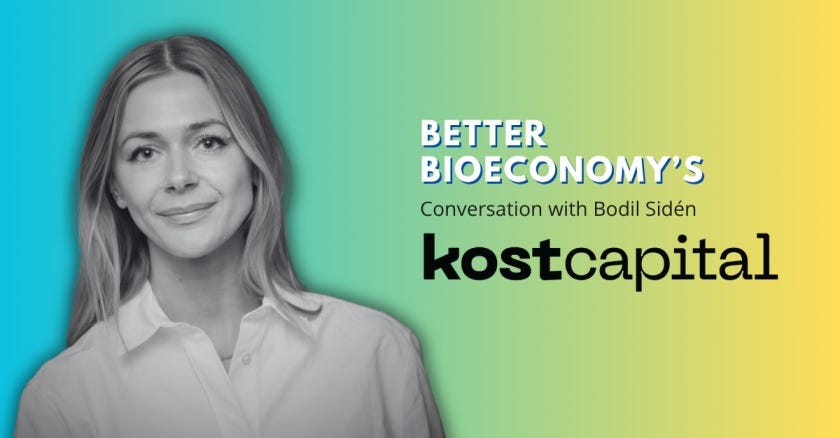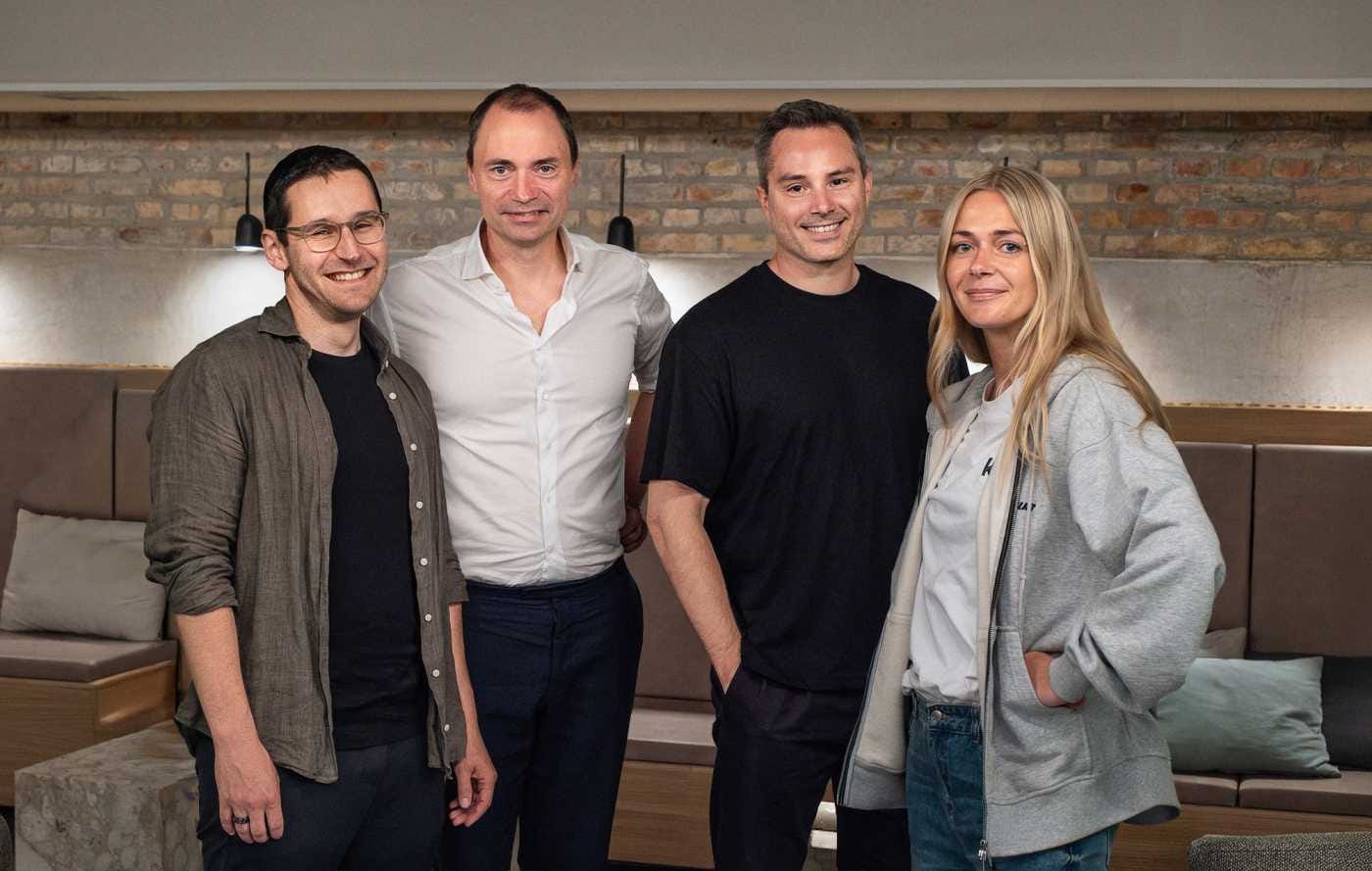Investing in Europe’s B2B Production Stack for a Better Food System
Kost Capital’s Bodil Sidén on the fund-and-studio model, founder signals that matter at pre-seed, and AI.
Hey folks!
Thanks for being here. For Issue #119 of Better Bioeconomy, I had the opportunity to interview Bodil Sidén, General Partner at Kost Capital, an early-stage venture fund and studio backing the B2B layers of the food system.
In our chat, we covered the architecture behind their fund-and-studio model, why the thesis favours infrastructure over brand-led plays, the founder qualities she looks for at pre-seed, and what an AI-first mindset looks like in practice.
Let’s jump in!
Walk into Kost Capital’s Frederiksberg hub, and the most important due diligence happens below street level. In the basement, a fully equipped test kitchen hums where a Michelin-trained chef and product developers put ingredients through the only trial that truly matters: will people want to eat this?
Upstairs, the investment team translates what happens on the plate into conviction, turning taste and texture into theses about defensibility, margins, and scale. The Danish fund invests in the enabling layers of the food system and runs an interdisciplinary studio that can turn a bench result into something on a plate within days.
It is not a typical set-up for a venture capital fund. But it gives Kost a competitive edge by generating decision-grade evidence and enabling it to co-invest with confidence across Europe.
Blending policy, tech, and venture to tackle food as climate
Before Kost, Bodil was a partner at early-stage VC blq invest, and has spent over nine years advising scale-ups across the Nordics. She began in Swedish politics, moved into tech at Uber, and later advised several Nordic startups before co-founding her first venture fund.
That combination of politics, tech, and venture shapes how she now approaches food as “the climate opportunity of the century.” Populations are rising, climate pressures are intensifying, and health issues are mounting. Bodil believes this makes the case for more food tech funding stronger than ever.
A fund and studio model converts kitchen results into decision-grade evidence
From its base in Denmark, Kost Capital invests in pre-seed and seed startups across Europe. It targets the enabling layers of food, such as ingredients, processes, platforms, and data, that support the wider industry.
A few of its portfolio companies illustrate this range. Italy’s Foreverland makes carob-based chocolate alternatives. In Denmark, SUMM Ingredients (formerly Nutrumami) creates multifunctional fermented proteins for cleaner formulations. France’s Nūmi works on cell-cultured human milk components for infant nutrition. And Amass builds an AI-powered scientific intelligence layer for bio and food teams.
Under the same roof, Kost Studio operates as an interdisciplinary venture builder and application lab. It validates claims in the kitchen and on the bench, turns them into working prototypes, and pressure-tests them with real users. The studio also supports product diligence pre-investment and application development post-investment, giving founders a partner that speaks both science and kitchen. When a clear gap exists without an obvious founding team, the studio can also launch new companies.
Denmark is the perfect home base for this fund-and-studio approach. Its longstanding industrial food sector, heavyweight biopharma presence, and decade of New Nordic gastronomy have created a culture where fermentation, formulation, and flavour live side by side.
Funding the food production stack
Kost Capital’s thesis of “better food for more people” begins with a deliberate focus on upstream building blocks. “We decided to focus on the building blocks,” Bodil said. “Go more B2B and find technology-driven solutions that can improve products and ingredients, no matter who produces them.”
That choice was shaped by the first waves of food tech, when many startups went straight to the consumer with splashy brands. Those products had to compete with incumbents for limited shelf space with high CAPEX, low margins, and unfavourable unit economics.
Kost’s approach is less anti-brand than it is pro-scalability. Precision fermentation costs are falling, bioprocessing tools have matured after years in pharma, and with the right enabling software, parts of product development can now be simulated before a single bioreactor is built.
Bodil draws a parallel to tech’s earlier cycles. The first wave of unicorns, like ERP and CRM companies, did not win by designing logos. They succeeded by solving core enterprise workflows for their customers, who were largely legacy enterprises at the time.
Applied to food, that means focusing on how we produce and move products across the value chain, from waste reduction to process technologies, rather than on the apples and pears at the end.
Co-invest by design to raise diligence quality and expand the capital pool
One of Kost’s goals is to “be the best co-investor in Europe.” This starts from recognising that the European food tech ecosystem is still in its early phase. “Within food, we are still in the ‘growing the pie’ phase,” Bodil told me. “It is collaborative, and climate and food investors across Europe share that view.”
That spirit translates into two complementary modes. Kost co-invests with other food and climate specialists that share its vision, and it partners with generalist funds as the domain expert when those funds want exposure to food but lack depth.
The baseline is collaborative rigour: combining strengths, sharing knowledge, and raising the quality of diligence. For investors, this means higher confidence in technical validation and application testing. Sharing expertise ultimately unlocks the best investments and attracts more capital from generalist funds into the sector.
At pre-seed, founder quality outweighs elegant ideas
Pre-seed is a people business. Bodil is candid about past misses: the times diligence overindexed for elegant solutions and did not spend enough time on the founder. Ideas pivot and markets move. What persists is the team’s ability to execute, to incorporate feedback, and to build an organisation that can hire and delegate as it grows.
She now optimises for three signals. First, outlier ambition with anchors. The vision should be large, but grounded in specific choices about where to start and what to ignore. Second, observable execution. The months-long dance of early diligence should show progress, iteration, and response to feedback. Third, scalable leadership. Can the founder attract talent and hand off responsibility, or will they become the bottleneck? “If you are going to build fast and scale, you need that inner compass,” she said, “and the temperament to grow beyond doing everything yourself.”
There is also a fourth filter that many founders underrate: fit with the investor. At the pre-seed stage, the relationship is active and candid, so alignment on feedback style, transparency, and tempo matters. “You don’t have to be buddies with the VC, but there has to be a match in how we help them become the best possible founders.”
AI-first mindset turns wet labs into faster learning loops
Given Kost’s interest in digital infrastructure and AI as steps toward treating “food as software,” I asked Bodil how she sees data and AI shaping food innovation and scalability. She noted that it’s both the mindset and the tooling that matter.
Food is under-digitised. That is a problem and an opportunity. Bodil’s view is that an AI-first mindset can let this industry skip slow adoption cycles, even when a startup is physical and wet-lab heavy.
In practice, it shows up in two behaviours. First, data by design from day one. The startups should decide what to measure, how to label it, and where it will live before experiments start. That means machine-readable protocols, consistent metadata, versioned datasets, and an explicit plan for linking lab outputs to cost and performance metrics. Models can be simple at first. The point is to create datasets that future capabilities can learn from.
Second, AI-enabled workflows by default. Before making a manual hire or spinning up a new process, the startup should ask whether simulation, prediction, or retrieval could replace or compress the work. In ingredient and process development, that looks like in-silico screening, design-of-experiments tools, and automated analysis that reduces dead ends. On the tools side, vertical software can serve whole swathes of the industry by lowering the cost of search, synthesis, and planning.
She pointed to Amass, a Kost portfolio company, as a working definition of “AI-first.” It is an AI platform for life science and biosolutions teams that unifies and semantically organises scientific literature, patents, and internal data. Users can then search, cluster, and summarise evidence quickly, export citations, and turn findings into plans. The goal is not AI for its own sake but tooling that lowers the cost of knowledge and, by extension, product development.
A small ask from Bodil
If you’re a bold founder curious about building an ambitious venture in food, Kost has several concepts in the pipeline ready to explore. Reach out to Bodil (bodil@kostcapital.com) or her colleague Paul Archambeau (paul@kostcapital.com), or use this link.
Final thoughts: 3 key takeaways from my chat with Bodil
Architecture is strategy. Kost’s fund and studio under one roof give the fund a genuine edge. They quickly turn bench claims into decision-grade evidence, improve co-investor confidence, shorten founders’ learning cycles, and draw more capital into the sector. Denmark’s mix of industrial food, biopharma, and New Nordic gastronomy only strengthens that advantage.
Pre-seed is a people business. Back outlier ambition with anchors, observable execution across the diligence window, and leadership that scales beyond the founder. Fit with the investor matters more than most founders expect: cadence, feedback style, and transparency can accelerate or stall the first 18 months.
Be AI-ready from day one or ASAP. You do not need complex models at the start. You do need data by design: machine-readable protocols, consistent metadata, versioned datasets, and clear links from experiments to cost and performance. The goal is to position the startup to benefit from advancements in AI.
If you found value in this newsletter, consider sharing it with a friend who might benefit from it! Or, if someone forwarded this to you, consider subscribing.





Hi Eshan, how are you doing on this wonderful day? I really like the format of these type of very informative newsletters. Issue #119 is great because it helps open my eyes more to the business and financing side of bio food. Excellent interview with Bodil, thanks for sharing. Keep up the fantastic work Eshan. Your subs appreciate all the hard work and considerable time it takes to create your awesome newsletters. Take care and have a very nice and peaceful week 😊 ❤️